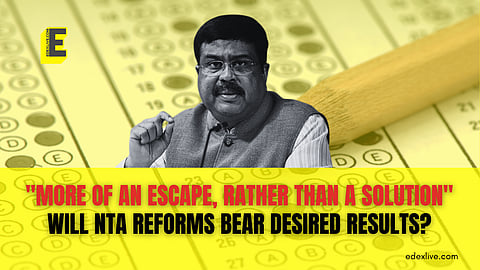

A robust examination framework is crucial for the growth of the educational system. In the Indian landscape, this structure has been significantly impacted by various security loopholes and examination delays.
Yesterday, Wednesday, December 17, Union Minister of Education Dharmendra Pradhan announced various reforms to the National Testing Agency (NTA). One of them is that from 2025, the agency will no longer conduct recruitment exams and will solely focus on higher education entrance exams. This announcement might have metaphorically severed the NTA's limb, but will this be good news?
Some may argue that prioritising higher education exams over recruitment exams could reduce the additional burden on the NTA, but is that really the case? Let's hear what the experts have to say.
Increased efficiency?
"The NTA's decision to focus solely on higher education exams appears to be more of an escape rather than a solution,'' said Dr Vivek Pandey, a health activist.
Elaborating on his statement, Dr Pandey explained that while this news may appear to be a welcome step toward addressing the issues, the question remains: Will removing the responsibility of conducting recruitment exams truly tackle the underlying problems, such as inefficiency, lack of accountability, and recurring mismanagement of exams?
Further expressing his doubts about the decision, the health activist added that instead of improving the system and ensuring better mechanisms, the decision was seemingly taken to mask its failure and is also denotative of the fact that it was never capable of handling multiple exams.
Education consultant and expert Jayaprakash Gandhi also expressed his reservations about the decision. Speaking to EdexLive, he accepted that while the decision may bring some positive news and aims to restore the trust students had lost, several questions still persist.
"Recruitment exams are crucial, as they help individuals secure jobs. However, they have not clarified which body will be responsible for conducting these exams, or if they believe the NTA is incapable of handling these exams. The question lingers," he said.
Regarding the issue, Gandhi suggested that the NTA implement additional reforms to avoid legal complications and take the necessary steps to ensure fairness and transparency. He further stated, "The National Testing Agency needs an overhaul. More qualified and efficient personnel need to be brought on board. Carefully planning and strategising their approach will also serve them well."
The expert also emphasised that governing bodies should stop experimenting with processes that create more challenges for students. "They must only implement policies when there's an assurance that it would not fail, and even if it does, they should have another plan in place," he added.
Pen-paper or computer?
That was not the only announcement made by Union Minister Pradhan. The education minister also shared that discussions are underway with the health ministry to determine whether the exam should be held in the traditional pen-and-paper format or the approach should shift to Computer-Based Test (CBT) mode.
While the deliberations are ongoing, Dr Pandey further criticised the NTA's stance, saying, "Their deliberation over effective formats seems more like an exercise in delay rather than proactive reform."
Expert Jayaprakash Gandhi opined that a CBT test would be more suitable for the cause. It may nullify the chances of paper leaks or malpractice that may occur with pen-and-paper-based tests.
What about multistage testing?
This year was a tumultuous one for the students appearing for the National Eligibility cum Entrance Test (NEET). Both the undergraduate (UG) and postgraduate (PG) aspirants had to undergo a time of mental duress arising from the paper leaks, delayed examination, and so on, further shedding light on the structural loopholes. Another question plaguing the minds of the students, particularly the NEET aspirants, is whether there will be multistage testing, and if this is true, then will it be a successful venture done by the NTA or another failed experiment?
Dr Pandey asserts that while a multistage testing system, similar to the Joint Entrance Examination (JEE), may seem advantageous in the beginning, NTA's record of technical failures and poor execution raises serious concerns.
He added that without flawless implementation, it could become another failed experiment, be more confusing, increase students' stress, and potentially create new opportunities for exam manipulation.
Gandhi told EdexLive that other concerns precede such decisions. "We have witnessed what happened with the NEET-PG exam, the exam was conducted in two shifts, and the marks were normalised. Later, when the matter was taken to court, the National Board of Examinations (NBE) failed to provide an answer. First, they must bring transparency then everything else," urged the expert.
He further said that although such decisions are welcome, the governing body of the NTA must not make any hasty decisions and take help from experts, educationists, teachers, students, and others, who can share their expertise on the matter.
Ten new posts and what else?
"The agency will be restructured in 2025, at least ten new posts are being created and there will be many changes in the functioning of NTA to ensure there is zero-error testing," announced the education minister yesterday.
Lauding the announcement, Jayaprakash Gandhi said it was indeed a good decision. They (NTA) should do anything to restore the students' trust. I suggest restructuring every three years and establishing an independent committee to evaluate every move of the NTA. "
But according to Dr Pandey such a declaration was more of a "bureaucratic exercise" directed towards action rather than achieving real reform.
He reasoned that adding new officials without clearly defining responsibilities and accountability might not resolve NTA's core problems.
The actions have come after the recommendations of the Dr K Radhakrishnan Committee, a seven-member panel established following the recent National Eligibility-cum-Entrance Test (NEET) paper leak, which had submitted its report to the Supreme Court in October.
